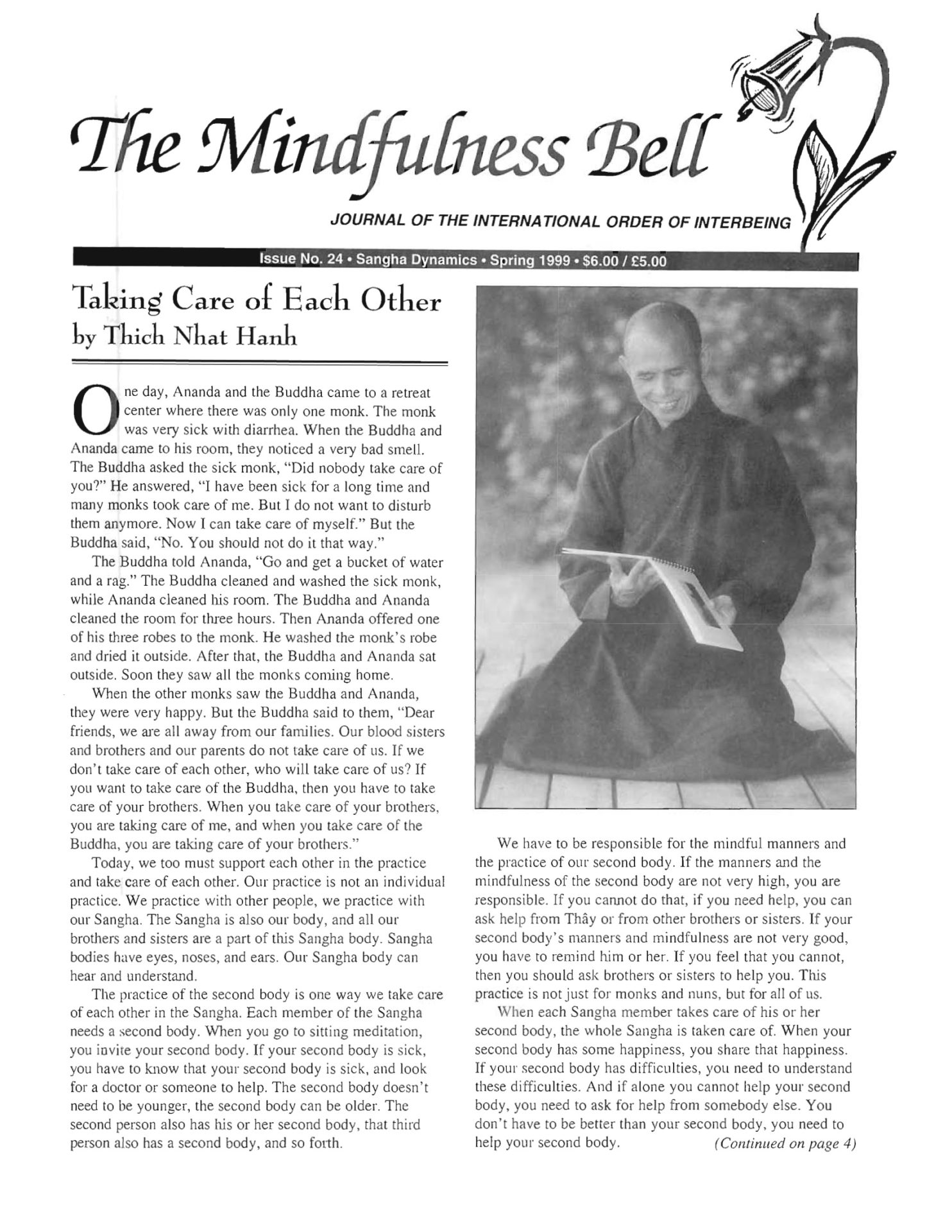By Bill Menza
Aware that much suffering is caused by war and conflict, we are determined to cultivate nonviolence, understanding, and compassion in our daily lives, to promote peace education, mindful meditation, and reconciliation within families, communities, nations, and in the world. We are determined not to kill and not to let others kill. We will diligently practice deep looking with our Sangha to discover better ways to protect life and prevent war. – The Twelfth Mindfulness Training of the Order of Interbeing
By Bill Menza
Aware that much suffering is caused by war and conflict, we are determined to cultivate nonviolence, understanding, and compassion in our daily lives, to promote peace education, mindful meditation, and reconciliation within families, communities, nations, and in the world. We are determined not to kill and not to let others kill. We will diligently practice deep looking with our Sangha to discover better ways to protect life and prevent war. - The Twelfth Mindfulness Training of the Order of Interbeing
Violence begets violence. When we practice the Twelfth Mindfulness Training, or the first of the Five Mindfulness Trainings, we undertake to cultivate reverence for life and to seek ways to end violence. But we often overlook official violence against criminal offenders. After studying the death penalty for over 18 years, I have reached some very sad conclusions about our treatment of prisoners, particularly those on death row.
Many prisons are violent places not so much because of the prisoners, but because of politicians, judges, and prison officials. In the name of being tough on crime and exacting vengeance, politicians and judges punish and kill offenders without mercy, and often without regard for the damage their actions inflict on individuals and society. Prison officials' duty to care for plisoners has been replaced by a falsely-perceived duty to punish. That a prison sentence itself was the punishment directed by the court is not considered sufficient. In many prisons, inmates are routinely threatened, beaten, shot, chained, hog-tied, electrically shocked, and denied food, mail, and medical treatment. Many are fed foul-smelling nutraloafs, a baked mixture of various foods. Instead of receiving psychiatric care, agitated prisoners are held for hours or days in the "devil's chair" that prevents all movement. A bucket under the chair collects their excrement.
Supermaxs and control unit prisons are now common. Supermaxs are usually reserved for violent offenders or troublemakers. In them, prisoners may endure solitary confinement for years or a lifetime. Control units are like supermaxs, but worse. They are sensory deprivation prisons constructed by the U.S. Bureau of Prisons, based on studies of the Nazi prison system and North Korea POW brainwashing techniques. In these units there is strict solitary confinement, and all out-of-cell contact is restricted. Prisoners are monitored by video cameras 24 hours a day. These prisons are designed to punish prisoners and make them compliant. They are reserved for violent or unrepentant criminal-political prisoners. Complete mental breakdown from being in a supermax or control unit prison is not unusual.
In these units, offenders are also denied contact with the sky, the trees, and Mother Earth- all in the name of "prison security." In Virginia, when prison officials for a supermax under construction realized prisoners would be able to see the forest and birds through their windows, they had the windows frosted. When Jamie Fellner, associate counsel for New York-based Human Rights Watch, asked Virginia Director of Prisons Ron Angelone about rehabilitation services at the Virginia Red Onion Supermax, he replied: "What are they going to be rehabilitated for? To die gracefully in prison? Let's face it; they're here to die."
The public, too, has constructed a wall of silent disinterest against criminals. Some people support the brutality and cruelty of prison in their delusion of vengeful self-protection. Because we are afraid of the violence in our society, we fail to see that the damage we do to these people damages all of society for generations to come. Our own neighbors accused and convicted of crimes have become our common enemy. We seem to think prisoners must be punished as severely as possible, or disposed of. Too often, they are treated as vermin to be exterminated or buried alive in concrete boxes.
In the end, we all suffer from this abuse. Violence and killing teach violence and killing, and the pain and suffering of this violence has no boundaries in space or time. A criminal offense affects crime victims and perpetrators, their families, and our communities; so does this official violence and killing. Aware of the nature of interbeing, we may see clearly the costs to all of us of this official violence. To maintain a prisoner killing program and to keep offenders who are no threat to others in prison for long periods has financial, emotional, moral, and spiritual costs. The current tough-on-crime mentality creates communities devoid of mercy and compassion, where we practice mindlessness and heartlessness.
We must look deeply with our Sanghas to discover ways to protect life and cultivate compassion. To help practice not killing, you might want to learn more about the death penalty and prisons, or write to political leaders and newspaper editors with the kind of letters that help them wake up from the delusion of violence, from the delusion that "might makes right." You might want to write prisoners who are waiting to be killed about the teachings on no-birth, no-death. Or consider working with groups that are trying to prevent and curb official violence. As written in The Dhammapada, "Animosity does not eradicate animosity. Only by lovingkindness is animosity dissolved. This law is ancient and eternal."
Bill Menza, True Shore of Understanding, is a member of the Washington Mindfulness Community, Amnesty International, Virginians for Alternatives to the Death Penalty, Virginia CURE, the American Civil Liberties Union, and Buddhist Peace Fellowship. He writes to prisoners, particularly those about to be executed by Virginia officials.

